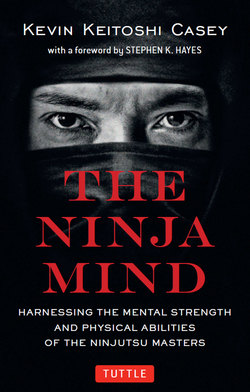Читать книгу Ninja Mind - Kevin Keitoshi Casey - Страница 8
ОглавлениеCHAPTER 2
The Nine Powers
Who hasn’t wondered whether magic is real?
Advanced staff training on Bear Peak. —Photo from author’s personal collection
In childhood, we are told amazing tales of human capability. People fly around, heal the sick, read minds, visit fantastic lands, and develop all manner of superpowers that they put to heroic use. Every culture around the world relates such stories, and many of them are remarkably similar in content.
The similarity might just echo basic human needs and hopes, but as we get older, and maybe try to fly a few times, we discover that it’s harder than it sounds. It turns out no one we can find is actually capable of such things, or at least not in ways like the stories. Gradually our childhood wonder gives way to a practical and adult mind that knows better than to believe in magic.
Yet, every now and then, a seemingly magical moment slips through. We might see something we don’t quite believe, a fleeting glimpse of another time or another’s mind. We might witness a momentary feat of strength or speed that seems beyond ordinary human capability, and then rationalize it as an illusion or a special coincidence of physics. We might be touched by a certain cosmic awe or sense of powerful forces beyond the physical, but then assign those experiences to a glitch in our neural chemistry or hand them over to the unknowable forces of religion.
Of course we don’t want to surrender our rational thought and sense of causality. It seems culturally, socially, and physically dangerous to do so. At the same time, some of us are never quite willing to let go of that childhood sense of magic. Partially it comforts us, but also at some level it still feels true, fleetingly just out of reach. Just when we’ve forgotten it or ceased to believe in it, some moment comes along in life that forces us to consider that there could be more to reality than what our conventional five senses perceive.
The situation was the same in old Japan. Legends from incredibly ancient times suggested great untapped powers in the human mind and spirit. Still, the average person saw few miracles performed, and so most people were divided into the faithful and skeptical. The faithful believed in everything, including religious authorities, wise men, snake oil salesmen, and folk remedies. The skeptical had enough piercing intelligence to see through many of the illusions, and drew the conclusion that there was no such thing as magic, or if it did exist, it was long forgotten and unavailable.
The ninja warriors, under extremely heavy pressure from lives of espionage and warfare, certainly were intelligent. Ungrounded superstition would have gotten them killed in short order by very violent and motivated conventional forces. Yet the ninja, operating at the edge of society, witnessed time and again the unusual cases of what a human being can do under pressure. Exposed to such situations, needing every edge they could garner, and free to explore all possibilities, the ninja developed a method of critical inquiry into what we might call magic or psychic powers.
Critical inquiry means they took the old superstitious ways that Japanese shamanism and esoteric Buddhism inherited from Chinese Taoism and they put them to the test. What really works? What powers can be developed? Of what practical use are they?
The ninja were not so much concerned with the ultimate nature of the powers, such as whether they were really magic, gifts from gods, or simply advanced applications of physics. The ninja needed to know what a human being could do, if well trained and well disciplined.
The results were legendary. The ninja accomplished feats thought impossible, and suddenly the ancient stories lived again. The ninja became a force far more powerful than their numbers, wealth, or equipment should have permitted.
One of the systems of studying the possibilities of human power was called the kuji. The kuji (literally “nine characters” in Japanese) were mystical symbols that represented a state of mind, a view of life, and a set of skills that worked together to produce extraordinary results. Some of the methods of the kuji look like modern Neuro-Linguistic Programming. There is also a bit of “the power of positive thinking” in there. At higher levels, some of it really looks like magic.
Unconcerned with the mechanics of how it works, the modern student of the kuji can subject their experience and performance to critical inquiry just as the ancient ninja did. A person can learn this form of magic while sacrificing none of their intelligence or education. The opportunity is a dramatically more effective and convenient life, even in daily activities, and the chance for some truly heroic moments.
My teacher Stephen K. Hayes is quick to point out you can’t learn the kuji from a book, because the understanding represented by the kuji requires certain experiences. He describes the kuji in his books and DVDs in order to set the stage for the experiences. The description is not the experience, but the description might help you recognize and relate to the experience when it comes along. If these powers intrigue you, you will eventually need to spend time with a qualified teacher who can illuminate the technique, but if you have read, studied, and reflected on these powers beforehand, you’ll have an advantage.
